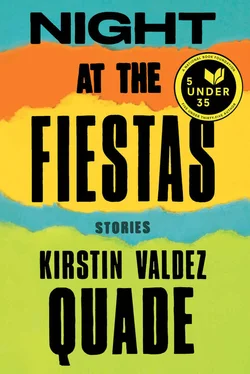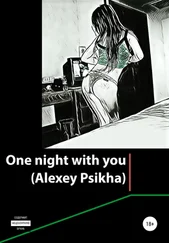Perhaps the painter had left the money for Frances intentionally. Perhaps he’d known she’d see the bag; it was a test, and by taking the money, she was admitting she was what he’d called her. In taking it she’d sullied herself, and he knew it and was laughing at her.
If that was the case, if he’d spent the whole night looking for her, this was a game she could play. She took his sweaty hand and danced toward him, swaying her hips, her purse and bag knocking against her.
“Here,” he said, lifting the strap of her swimming bag. “Take a load off. Makes dancing more fun.”
“No,” said Frances, jerking back, ready to claw and scream and bite if need be. Then she smiled. “I’m fine, thank you.” He slid his arm around her waist, and Frances felt a glorious sensation of free fall.
Nancy appeared at her elbow. “Who’s your friend, France?” She stuck her hand out, mock formal. “Nancy. Frances’s cousin.” Nancy stumbled over the s ’s and tried again more deliberately. “Frances’s.” She was drunker than Frances had thought.
The painter released Frances to shake her cousin’s hand. “Charmed,” he said and brought it to his lips.
“So you’re the painter. Frances said you were incredible.”
He grinned at Frances, a wide, knowing grin. “I am incredible. Not to be believed.”
Nancy laughed, and Frances did her best to mirror her cousin, to look like a high school girl cheerfully celebrating 268 years since de Vargas’s retaking of Santa Fe. Nancy lost her balance and started to stumble. The painter caught her and didn’t take his hand off her elbow after she’d steadied. He winked at Frances, and just like that the music drained out of her.
Under the west portico, some kind of commotion. A man on horseback pumped his arms, then nudged the horse forward and into the Plaza Bar, ducking as he passed through the door. Catcalls, cheers, and a moment later, man and horse backed out; whooping, calling patrons spilled after him.
The band struck up “La Cucaracha” for the third time that night, and the crowd sang along, mumbling and braying through the lyrics.
The painter grabbed Frances’s wrist. “I think you owe me a drink. You and your cousin both.”
“No, thank you. We can’t.” Frances detached herself and took her cousin’s hand, intending to draw her into the crowd and away from the painter, but Nancy shook her off.
“She doesn’t talk to boys,” said Nancy, laughing. “They terrify her.”
“Not me,” said the painter. “I don’t terrify you, do I? This afternoon I didn’t terrify you a bit.” He turned to Nancy, whose elbow he was still holding. “She’s not really so hopeless. We had a terrific conversation all the way from Wagon Mound. I told Frances all about my painting.”
“Tell me,” said Nancy, canting her head in the way she thought was sexy and probably was. “What do you paint?”
He regarded her, thumbing his mustache. “All kinds of things. Portraits, for one — especially of beautiful women.” He smiled. “I get paid a lot of money for my portraits. Isn’t that right, Frances?” His smile vanished.
“We need to go, Nancy,” she said, but her cousin ignored her.
“And you have shows in Paris and London?”
The painter laughed, returning his attention to Nancy. “Oh, yes. I’m always on the lookout for models.”
“I bet you are,” said Nancy, laughing. “I bet you look high and low for pretty girls. But I’m listening.”
It would have been so easy now to say, “I found something of yours,” to hand over the lunch bag and slip into the crowds with Nancy, but Frances said nothing. Really, there was no question of giving back the money. It was already a part of her, or not of her, but of the Frances she was becoming. Already the money had transformed into Frances’s future: her next year and her year after that, and all the years that would take her away from the tongue-tied, stiff-legged person she was now.
When the painter leaned in to say something to Nancy, Frances broke away and pushed through the crowd toward the bus depot. She weaved around people, forcing her way through their laughs and protests. At the edge of the Plaza she turned, expecting to see the painter at her heels, but the crowd was oblivious, caught in its own net of drunkenness.
She ran, her heels catching on the uneven sidewalk, dodging a group of men with painted faces and massive feathered headdresses. They called to her with war whoops, but she didn’t stop until she reached the depot.
There Frances waited, but her father’s bus didn’t come. Of course not; he was fast asleep now, at home in Raton. He wouldn’t even wake up for another four hours, and it wouldn’t be until noon tomorrow — today — that he’d pull in at the depot. Still, a part of her thought he’d somehow know she was waiting for him, or that fate would intervene with a breakdown or a baby left behind, anything to disrupt his route and send him back. She thought of her father’s jabber on the bus and her irritation, then remembered that she hadn’t told him she loved him. Her eyes welled.
She could hear the music from the Plaza. That pounding, tireless mariachi cheer! A group of revelers passed noisily on the sidewalk, and Frances braced herself to fight them off if need be. No one looked her way.
For the first time it felt like September; the air had that chill. Frances tightened her cardigan and rifled through her swimming bag again. But there was nothing warm there, nothing she needed, just some clean underwear, her short summer nightgown, another flimsy sundress. Nothing else except the money. She began to count it again. It was all there, minus two Frito pies. She shoved it back into the paper bag, feeling sick.
Frances opened her book, but it was too dark. She could barely see the words, couldn’t have followed the story anyway. Frances would not think about Nancy and the painter. She would not think of what he was doing to her cousin — her younger cousin, a child she ought to be watching out for. She wouldn’t think of them on the mattress in his dingy one-room shed, Nancy stretched out lush and pink, waiting to be painted. As he moved toward her, the painter would tell Nancy how beautiful she was, even though he didn’t have to, not now that he had paid for her. Poor Nancy would close her eyes and listen. Frances could almost smell his breath as he leaned in. Nancy, who didn’t understand how the world worked, who didn’t understand that people could be cruel, would believe everything he said.
As if conjured, the painter appeared at the top of Water Street, and Frances’s heart stilled. He was walking slowly toward her, head bent as if absorbed in thought. He seemed to have lost his jacket now, too. A beer bottle swung between his fingers.
Even if he lifted his head, from this distance he might miss Frances sitting on her bench in the shadows, his paper bag in her lap. He wouldn’t see her until he passed directly in front of her. She wondered if the painter, too, had been drawn to the bus station by the promise of return, if he, too, was counting the hours until he could head back north, though he’d be leaving without his bolo tie, without his jacket, without his money. He rubbed his arms, seeming to feel the cold.
The street was empty now but for the two of them, the painter at the top of the block, Frances waiting like his bride. As he approached, she clung to the sack, her heart sloshing in her chest. If he looked up, he’d see her. Frances imagined the scene: the dark windows of the depot, the framed schedules, and a young girl, defenseless on her bench. Except that she wasn’t defenseless; she was solid and powerful and rich. Frances held still, her grip cold on the bag. As he neared, his progress intolerably slow, the hairs on her bare legs lifted. Surely he saw her. Twenty feet, ten. Now if she reached out from the shadows she could almost touch him, and then, like a breath, he was beyond her.
Читать дальше












